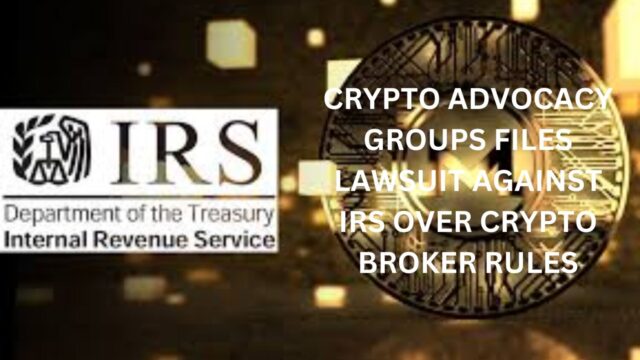Key Takeaways
- Critics argue the rule could stifle innovation, impose burdensome compliance requirements
- The lawsuit claims the rule imposes unmanageable obligations on software developers who create trading interfaces for decentralized platforms
Three famous pro-crypto groups- The Blockchain Association, DeFi Education Fund, and Texas Blockchain Council have filed a lawsuit against the Internal Revenue Service (IRS) over its newly finalized broker reporting requirements for decentralized finance (DeFi) platforms.
The lawsuit, filed in the U.S. District Court for the Northern District of Texas, contests the IRS and Treasury Department’s expanded definition of “brokers,” which now includes decentralized exchanges and other DeFi front-end platforms.
The contested rule, announced on December 27, mandates DeFi platforms to report all digital asset transactions, including taxpayer details, starting in 2027. As per the IRS, the regulation aims to enhance transparency and ensure compliance with tax laws by aligning digital asset reporting with traditional financial reporting.
The IRS estimates that up to 875 entities in the DeFi sector could fall under this category. However, the crypto advocacy groups argue that this expansion overreaches the IRS’s statutory authority and infringes on constitutional rights.
Critics argue the new rule could stifle innovation, impose burdensome compliance requirements, and drive technological development overseas.
Kristin Smith, CEO of the Blockchain Association took to X to express her opinion on IRS’s latest move. She said, “The IRS and Treasury have gone beyond their statutory authority in expanding the definition of ‘broker’ to include providers of DeFi trading front-ends, even though they do not effectuate transactions. This is not only an infringement on privacy but also a push to move this technology offshore.”
The lawsuit claims the rule imposes unmanageable obligations on software developers who create trading interfaces for decentralized platforms, effectively hindering the growth of a burgeoning industry.
Lee Bratcher, President of the Texas Blockchain Council, highlighted the impracticality of compliance, noting that many DeFi platforms operate without the centralized structures necessary to collect or report such information. “This regulatory overreach risks driving critical development overseas, threatening U.S. competitiveness in the digital economy,” Bratcher said.
Miles Jennings, General Counsel at a16z Crypto, dubbed the move as a “fantastical expansion” of the term “broker” and further warned that it could set a precedent for increased regulation of DeFi platforms.
Proponents of the rule argue that it seeks to close tax gaps and ensure that digital asset transactions are taxed fairly.
Aviva Aron-Dine, Assistant Secretary for Tax Policy, defended the regulation, stating, “These regulations will help ensure that all taxpayers play by the same set of rules and have access to the information they need to file their taxes accurately. Aligning tax reporting for digital assets with traditional assets will make filing easier and more cost-effective for compliant taxpayers.”












